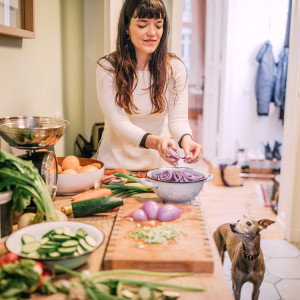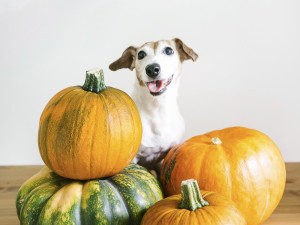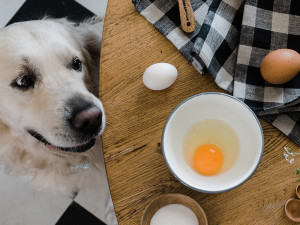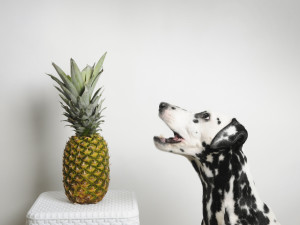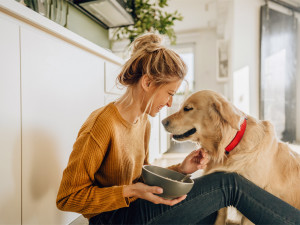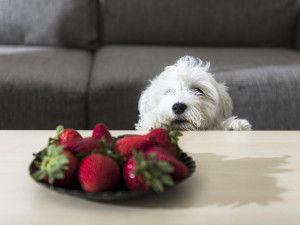Can Your Dog Eat Baby Food? Find Out if It Will Make Them Sick or Not
Everything you need to know to make an informed decision.
In This Article:
Can Dogs Eat Baby Food? Types of Baby Food Dogs Can Eat When to Consider Baby Food For Dogs How to Introduce And Feed Your Dog Baby Food Frequently Asked Questions
I think all of us at one time or another have thought about eating baby food. Why not? It’s a perfect, all-in-one food that’s easy to eat and digest. OK, maybe we haven’t all thought about it, but some of us have definitely thought about feeding it to our dogs. Our dogs have likely thought about eating it as well.
Fortunately, most baby food is okay for dogs to eat, but you need to be careful about some ingredients, mainly onion, garlic, and xylitol. It also should be a treat rather than a meal for your canine companion.
Can dogs eat baby food?
Most baby foods are safe for dogs to eat. Let’s just keep in mind that most dogs don’t need baby food. They should be getting the bulk of their nutrition from good quality dog food and given baby food as a treat or for short-term feeding only.
How much do you spend on your pet per year?
Types of baby food dogs can eat
Baby foods come in stages. Stage one features single-ingredient foods blended to perfection, while stage two introduces slightly chunkier mashups of multiple ingredients.
Stage-one foods are the best choice for dogs as you know exactly what’s in them. Many different fruits and vegetables are safe for dogs to eat, and these single-ingredient varieties decrease the risk of including ingredients your dog shouldn’t have.
As for stage-two foods, you’ll need to be a little more careful. These are the ones that dogs are more likely interested in as they can include meats and vegetables.
Ingredients to avoid in baby food for dogs
It’s not typically the main ingredients that are a problem in baby food; it’s the seasonal additions. Onion and garlic are a couple of the main issues. These seasonings provide additional flavor, but they can be detrimental to dogs, potentially causing digestive issues such as vomiting and diarrhea and even red blood cell damage.
Another ingredient on the absolutely no list is xylitol. Xylitol is a sweetener that can be added to sugar-free products, including candy, peanut butter, toothpaste, and even baby foods. This sweetener can potentially cause a rapid drop in blood sugar levels and sometimes liver failure.
When to consider baby food for dogs
Your dog doesn’t need baby food, and it should by no means replace dog food on a long-term basis, but it may serve a purpose in some cases. Feeding baby food may be a good idea when:
You have a picky eater who needs a little encouragement. Baby food is very similar to canned dog food in terms of texture and enticing smells, so it may encourage a dog to eat. However, canned dog food may still be the better option as you have less chance of giving them risky ingredients. Feeding puppy food may also entice your dog to eat, but it’s not something they should eat long-term.
Your pup has a digestive illness. Baby food is highly digestible, which is part of the reason it works so well for babies. When a dog is experiencing a digestive issue, the easier a food can be broken down and utilized, the better. Baby food can provide your pup’s system with nutrients while providing their system a much-needed break.
You need a convenient treat. Baby food comes in small packages, is easily portable, and can be used for a quick lick or toy filler for your dog. While baby food may be good in these cases, there are other dog-specific options out there, so don’t limit yourself to baby food for these reasons.
How to introduce and feed your dog baby food
As with all foods, you don’t want to make the change to your dog’s diet abruptly. Of course, when dogs stop eating or develop an illness, a gradual transition isn’t always possible as you just want them to eat something. However, a gradual transition is always better if possible because it allows their microbiome to adjust to the new food.
Monitor your pup for any issues when you start to feed your dog baby food. Things like vomiting, diarrhea, or stomach pain are all signs that you should stop the baby food and try something else. If your dog won’t eat baby food or anything else for longer than 24 to 48 hours, consult your veterinarian.
Baby food doesn’t provide complete nutrition for your dog, so it shouldn’t make up a substantial part of your dog’s diet for longer than a few days. Use it to entice your dog to eat a more balanced food or use it in moderation as a treat along with their regular diet.
Bottom line
Baby food can be an enticing treat for training or a substitute meal for picky eaters or dogs feeling under the weather.
Not all ingredients in baby food are safe for dogs, with onions, garlic, and xylitol being toxic, and it isn’t something that you want to feed a lot of for long periods.
If you want to try giving your dog baby food, speak to your veterinarian first to make sure it’s a good idea.
FAQs
Is Gerber baby food safe for dogs?
Gerber is a well-known baby food manufacturer that’s been around for nearly 100 years. They have thrived by producing quality, safe products for babies, so you can likely trust that their food undergoes rigorous testing to ensure its safety. That being said, Gerber baby food is made for humans, not dogs, so you’ll still need to check the label for ingredients that could be potentially toxic to dogs, and only feed it in moderation.
Which baby food pouches are safe for dogs?
The brand of baby food doesn’t matter as much as the ingredients. You’ll want to avoid things like onions, garlic, and xylitol, and look for a product that is trusted by pediatricians and parents to help ensure its quality.
Can I give my sick dog baby food?
Baby food is an option for sick dogs to provide highly digestible nutrition. However, it’s not the only option and some dog-specific products may be a better choice. Talk to your veterinarian about what you can feed your sick dog to make sure you’re giving them the nutrition they need in a safe manner.
References
Hayes, Cristine, DVM. “Garlic and Onion (Allium spp) Toxicosis in Animals.” Merck Veterinary Manual. Sep 2024. https://www.merckvetmanual.com/toxicology/food-hazards/garlic-and-onion-allium-spp-toxicosis-in-animalsopens in new tab.
Suchodolski, Jan S. “Analysis of the Gut Microbiome in Dogs and Cats.” Veterinary Clinical Pathology. 12 Sep 2021. https://pmc.ncbi.nlm.nih.gov/articles/PMC9292158/opens in new tab.


